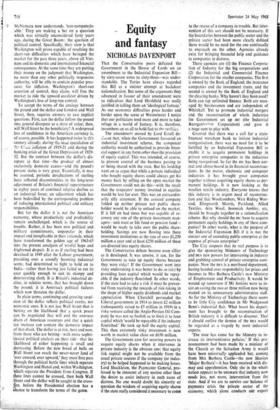Hope and despair
WALL STREET WILLIAM JANEWAY
'If the dollar goes the way of the pound. will Wall Street follow the London Stock Exchange?' The assumptions behind this question—perhaps the most often asked when two market men from different sides of the Atlantic get together —are of greater interest than any possible answer. For the question, and its underlying premises, reflect the feeling of many that stock markets and the western financial world gener- ally are entering a new era, the like of which has not been seen for a generation.
The London market's extraordinary rise in the face of bad economic and worse political prospects is attributed by the City's old hands to a loss of confidence in the currency; due allowance being made for corporation tax, capi- tal gains tax, and stringent foreign exchange controls. Wall Street's new breed of techni- cians respond that the New York market, too, is in for a similar secular boom, stretching for years forward, as domestic inflation and inter- national financial disruption direct investors increasingly into real assets. Healthily or not, the history that is to be re-enacted for the fore- seeable future, we are told, is not that of 1929- 31, but rather that of 1924-29.
The: new bulls on Wall Street, in fact, are making a paradoxical bet on a subject that is unquantifiable and, as perhaps even Mr Robert McNamara now understands, `non-computeris- able.' They are making a bet on a question which was virtually unconsidered forty years ago, during the Great Boom : the question of political control. Specifically, their view is that Washington will prove capable of resolving the short-run difficulties which have besieged the market for the past three years, above all Viet- nam and its domestic and international financial consequences. At the same time they are putting their money on the judgment that Washington, no more than any other politically responsive authority, will be able to contain popular pres- sures for inflation. Washington's short-run assertion of control, they claim, will free the market to ride the upward escalator driven by Washington's loss of long-run control.
To accept the terms of the analogy between the pound and the dollar and London and Wall Street, then, requires answers to two implicit questions. First, can the dollar follow the pound into general disrepute as a store of value; then, will Wall Street be the beneficiary? A widespread loss of confidence in the American currency is, of course, possible. It has happened twice in this century already; during them-ad speculation of Cr.ai inflation of 1919-21 and during the banking crisis of the Great Depression of 1929- 32. But the contrast between the dollar's dis- repute at that time—the product of almost exclusively domestic causes—and the pound's present status is very great. Essentially, it may be asserted, periodic devaluations of sterling have reflected discontinuities in the long-term adjustment of Britain's financial superstructure to eighty years of continual relative decline as an industrial force; an adjustment which has been bedevilled by the corresponding problem of reducing international political and military responsibilities.
But for the dollar it is not the American economy, whose productivity and profitability remain unchallenged, which is the source of trouble. Rather, it has been new political and military commitments, unpopular in their impact and inexplicable in their rationale, which have transformed the golden age of 1963-65 into the present amalgam of wistful hope and frightened despair. It is as if sterling had been devalued in 1949 after the Labour government, presiding over a soundly booming industrial scene, had determined to fight to hold on to India—rather than having just failed to cut its coat quickly enough to suit its skimpy and deteriorating cloth. It is Britain's industrial de- cline, in relative terms, that has brought down the pound; it is America's political failures which now threaten the dollar.
In plain terms, continuing and growing suspi- cion of the dollar reflects political events, not economic ones. It is not just Wall Street that is betting on the likelihood that a quick peace can be negotiated that will end the overseas drain of American resources and that a quick tax increase can contain the domestic impact of that drain. The dollar is at risk, here and now, from those who are betting—with more sophis- ticated political analysis on their side—that the likelihood of either happening is small and decreasing. Before the new breed of bulls on Tall Street can reach the never-never land of ever onward, ever upward,' they must first pass through the political battle lines which separate Washington and Hanoi and, within Washington, which separate the President from Congress. If these lines cannot be crossed, then both Wall treet and the dollar will be caught in the cross- e, before the Presidential election has a
nce to transform the terms of the-game.







































 Previous page
Previous page